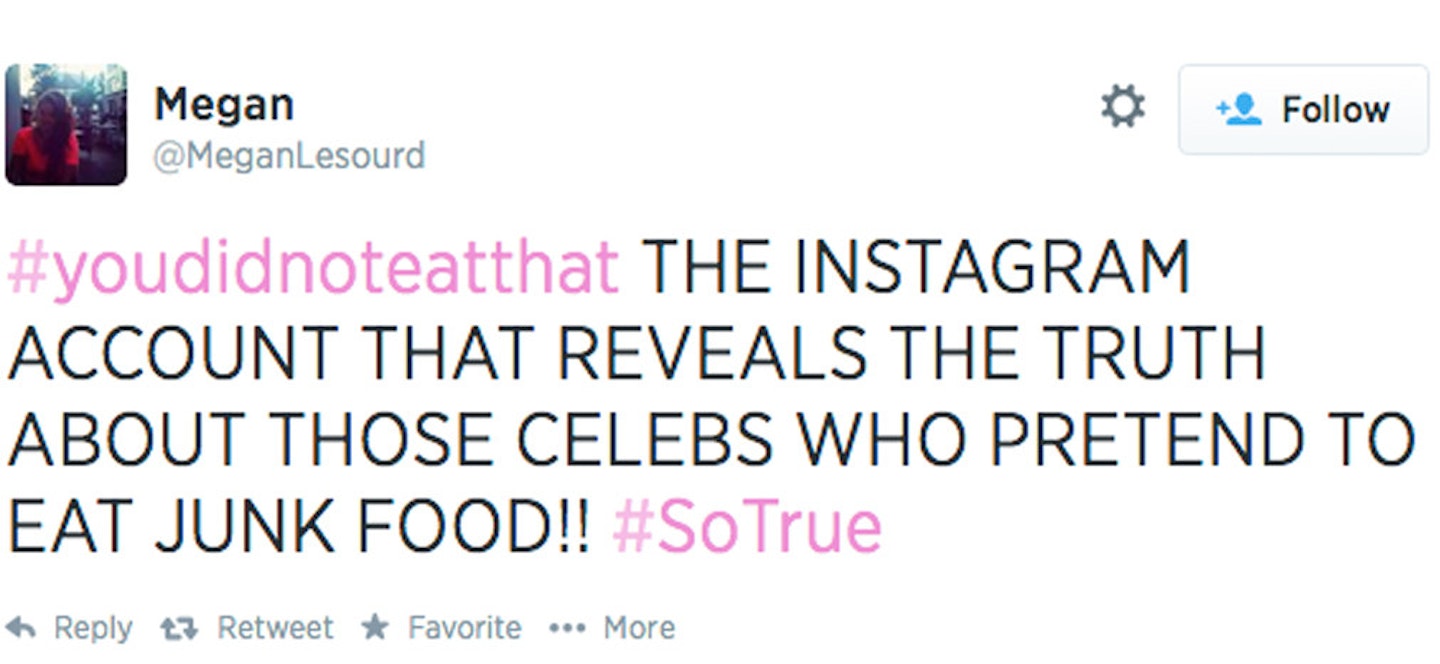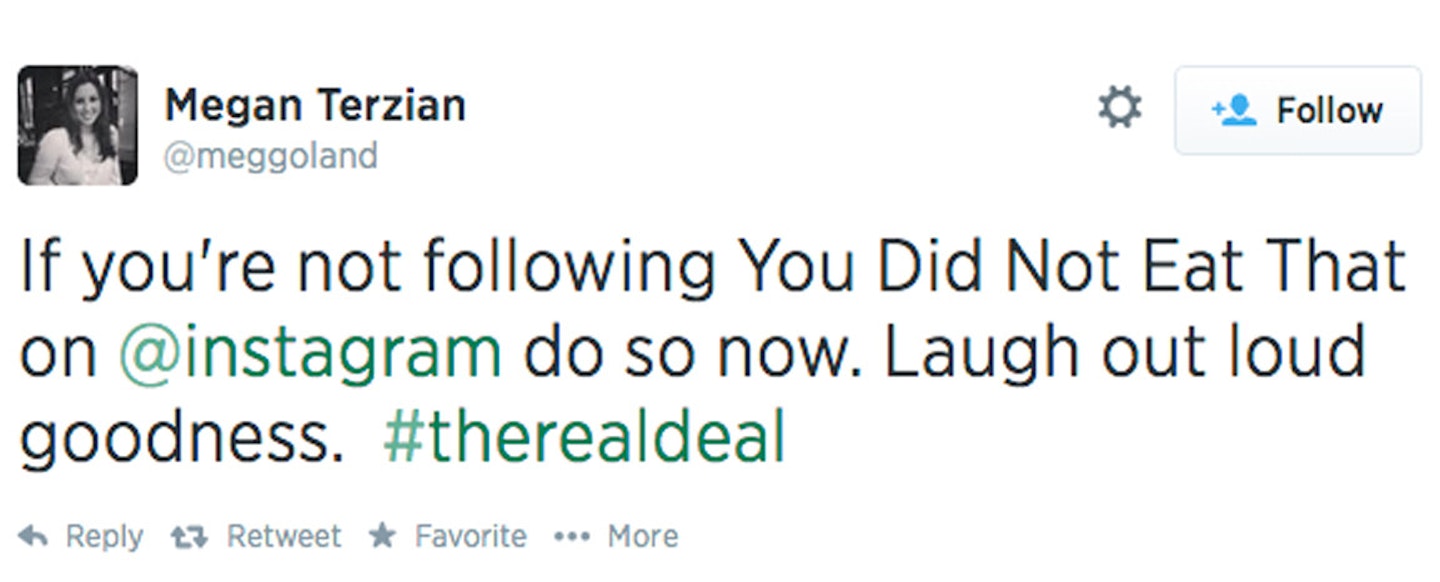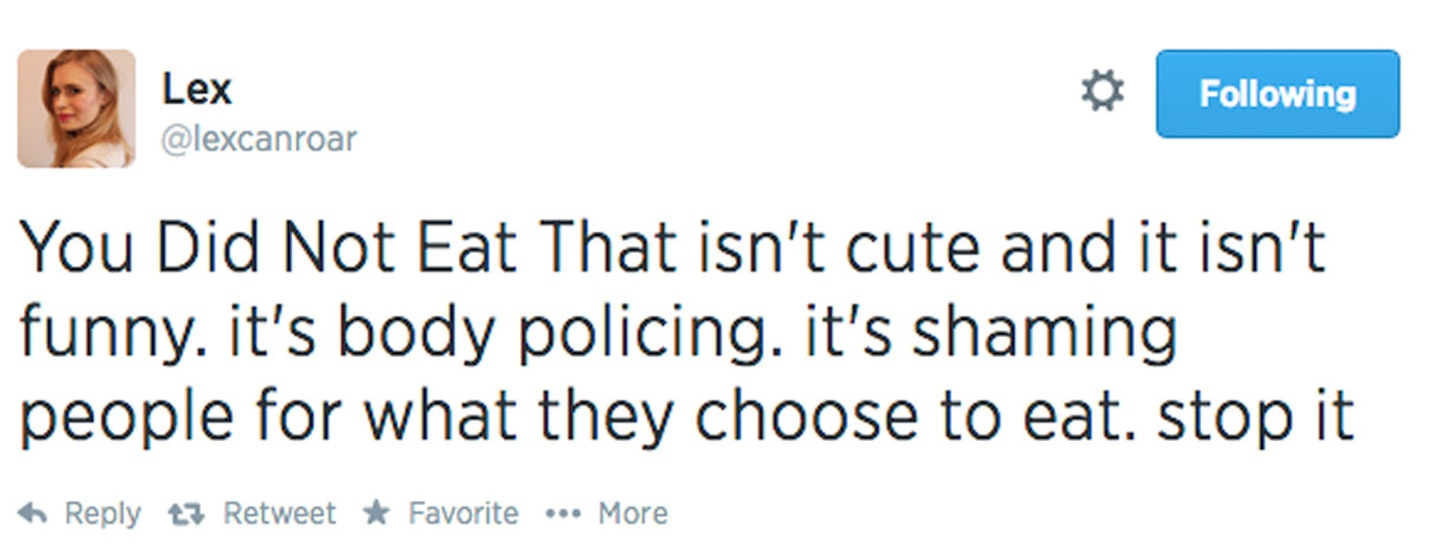A few months ago we scrolled our way onto a new Instagram account @youdidnoteatthat. A niche spoof account with just 1,000 followers, it consisted of re-posted pictures shared by supermodels, fashion bloggers and other fashionistas with high social media currency, of themselves plus a high volume of junk food. Think glossy burger ’n’ beach shots, hotdogs and underwear, magnums in bed – that kind of thing. We thought it was pretty funny, we'll admit. Like most, we’d had our fill (pun intended) of the cupcake selfies and a snipey caption under a re-grammed picture raised a legitimate point about the empty calories and artificiality of a thrice-filtered Instagram existence.
But like Kate Moss’s immortal line, ‘Nothing tastes as good as skinny feels,’ the account divided opinion from its inception.* Lucky* mag’s Eva Chen and Into The Gloss’ Emily Weiss found it straight up funny. Subjects of YDNET’s mocking commentary, such as Man Repeller’s Leandra Medine who posted an Insta video of her devouring a cupcake, or We Wore What’s Danielle Berstein, who shared a picture of a hotdog and a beverage – suffixed with #iatethis #anddrunkthat hashtags – riffed right back. Others, however, were incensed. Cupcakes and Cashmere’s Emily Schumann and Sincerely Jules’s Julie Sarinaña banned YDNET from following them, after the account's merciless ribbing of their kcal intake.
But it was when The Cut interviewed the anonymous founder of the account a few weeks ago – which rather intriguingly revealed them to be a fashion industry insider of ten years - that the interest and backlash soared. At the time of writing, YDNET has 96k followers and the accusation of skinny-shaming are coming thick and fast. ‘I’m calling bullshit on this skinny-shaming tripe because it’s not funny, it’s not okay and I’m sick to death of women being called out for what they have or haven’t eaten,’ wrote Ellen Stewart inMyDaily. Meanwhile, The Huffington Post – who initially found the account humorous - revised their opinion of the cult account a few days ago, conclduing that ‘there are far better ways to call out the hypocrisy of the fashion and beauty industry than shaming models for Instagramming a bagel’.
Twitter is similarly divided. Some find it straight up funny.


Others, are disgusted.


There’s no doubt that the account is provocative and in its methadology – placing all the emphasis on what a woman is consuming – pretty ill-judged. But it’s not hard to see how we arrived at YDNET. ‘There’s been a mega movement towards glamorising food in fashion,’ writes Fashion Editor at Large’s Bethan Holt. ‘Think Karlie Kloss’s cookies, Chanel’s supermarket and Jourdann Dunn’s cookery show.’ And on occasions, this glamourisation has segued into outright fetishisation. Jeremy Scott’s collection for Moschino was an ode to pop culture and junk food. Whilst all of this has gone someway towards democratising an elite industry – and busting the myth that models don’t eat – it has also given rise to an often unattainable goal. Or as Bethan puts it, ‘To eat whatever you like and stay a size 6.’
For some, of course, that is a reality. A high metabolism is a card which some people are lucky to be dealt with in life, whilst others work really hard to be able to enjoy treats – facts that YDNET is accused of ignoring. But frustrating as it is for the subjects of this account that have perfectly healthy diets, a svelte fashion blogger who is clearly being paid to endorse hamburgers and therefore regularly Instagrams herself double parking a beefburger – we’re not naming names – is hardly promoting the right body image. Her financial gain is another teenage girl's confusion, eh? For all the #fitspo movement going down right now, there's a junk food bikini counter-culture. It all comes down to our fucked-up obsession with effortlessness; to remain super-toned whilst guzzling empty, E-numbered calories. It's not only unrelatable, it's unrealistic. A leading fashion blogger confided to The Debrief that she knows more than one blogger who buys coloured macaroons by the boxful – they are the prettiest prop after all – just to discard them, untouched, once the photo opportunity has been captured.
It is none of our business what someone we follow on Instagram does or doesn't eat. We have become, as a culture, extraordinarily obsessed with whether or not a woman has an eating disorder – as if we somehow have the right to be privy to that knowledge. In her interview with The Cut, YDNET says that she is not trying to skinny-shame. 'This is not me making some huge social commentary about what size somebody is and what they're eating… It’s just presenting this curated life that's beautiful and perfect and totally unrealistic. More power to you for rocking that! You look awesome! Don’t lie about how you got there!’
And therein lies the rub. Because whilst the account has arguably failed at not skinny-shaming, you could also argue that it’s equally damaging to share a smug donut selfie with thousands of impressionable teenage followers – who will then think that a regular diet of donuts and pizza can buy them that kind of lifestyle, too.
Follow Pandora on Twitter @pinsykes
This article originally appeared on The Debrief.
